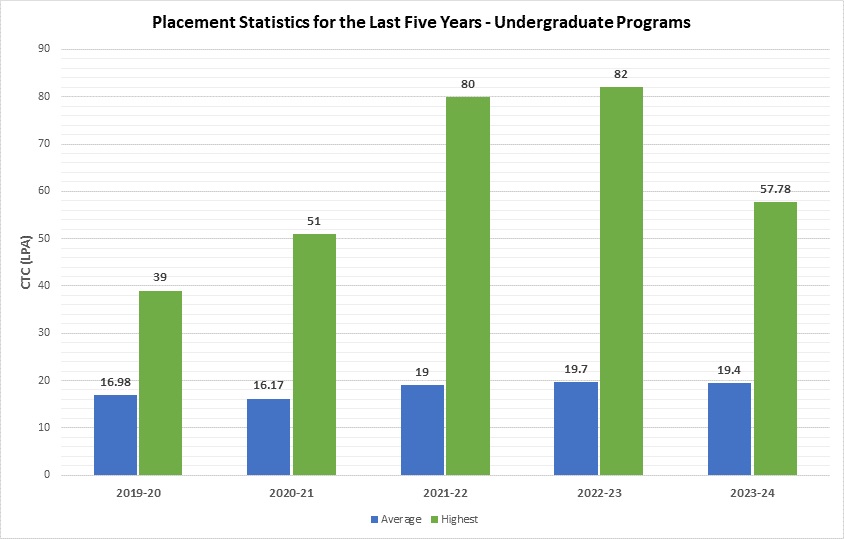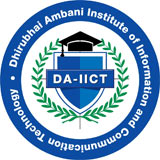Admission to the UG Programs for the academic year 2025-26 is closed.
The Orientation Schedule for UG Programs (AY 2025-2026) is available here
- Important Dates
- Intake
- Program Structures and Brochures
- Placement Statistics
- Fee Structure
- Scholarships
- How to Apply
- FAQs
- For Inquiries
- Important Notes
| Registration and document verification at DA-IICT campus for confirmed candidates (as per intimation) remaining candidates (All India Category, NRI category and ACPC admitted candidates) | 04 Aug 2025 (9:30 hrs. to 12:30 hrs.) |
| Orientation Program | 05-08 August 2025 |
| Commencement of classes | 11 August 2025 |
Number of seats: 111
- B.Tech. Information and Communication Technology (ICT) – 63
- B.Tech. (Honours) in ICT with minor in Computational Science – 23
- B.Tech. Mathematics and Computing – 15
- B.Tech. Electronics and VLSI Design – 10
B.Tech. Information and Communication Technology (ICT)
Information & Communication Technology (ICT) embodies the convergence of Computer and Communication systems and has obtained wide acceptance as a distinct discipline. ICT is considered to be a discipline dealing with accessing, storage, processing, transmission, reception and display of information, primarily using digital systems and techniques. The curriculum in the B.Tech. (ICT) program tries to address the optimized convergence of existing Computer Science and Engineering (CSE) as well as Electronics and Communication Engineering (ECE) disciplines by identifying the broad areas of performance capabilities. It is also expected that B.Tech. (ICT) graduates would enjoy a special niche only if they have certain performance capabilities not found in conventional CSE and/or ECE graduates. For details of the program click here.
The program brochure can be found here.
B.Tech. (Honours) in ICT with minor in Computational Science
Computational Science is concerned with constructing mathematical models, simulating and quantitative analysis techniques, and using computers to analyze and solve scientific problems with applications in engineering and social sciences. In Computational Science, unlike the traditional theoretical and experimental approaches, scientists and engineers gain understanding mainly through the analysis of mathematical models implemented on computers. Typically, these models require massive amounts of calculations and are often executed on high performance computing backbone consisting of supercomputers or distributed computing or several inter-connected clusters of workstations and personal computers. The curriculum in B.Tech. (Honours) in ICT with minor in Computational Science aims to provide expertise to the students in techniques involved in modelling and simulation of complex and large scale systems, implementation on computers through parallel and high performance computing techniques and finally analysis and visualization of these large scale data sets. Further details of the program are available here.
To complete the B.Tech. (Honours) in ICT with minor in Computational Science Program successfully, the students have to take additional 18-24 credits worth of courses besides the usual ICT courses. The student must obtain a minimum CPI of 6.5 after completion of third Semester to continue in the program failing which she/he will be moved to the B.Tech. (ICT) Program. The students who have obtained a CPI of 7.5 and above may apply at the end of the third Semester for transfer to the B.Tech. (Computational Science) Program and the transfer will be granted only subject to availability of seats and in descending order from the highest CPI obtained.
The program brochure can be found here.
B.Tech. Mathematics and Computing (MnC)
Mathematics and Computing (MnC) is a fusion of Mathematics and Computer Science that has obtained wide acceptance as a distinct discipline over the past few years. It arises out of dealing with Mathematics as a fundamental tool in computing and with Computing as a primary component of mathematical problem solving. The program has been specially designed to meet the increasing needs of professionals who would be able to respond to the convergence between mathematical and computational problem solving.
The program aims at expanding the mathematical, algorithmic and computational thinking of students and at providing sufficient and solid foundation for skill development in MnC. A strong mathematical foundation would enable the study and analysis of abstract concepts and to model many real life problems mathematically, algorithmic thinking would provide ways to solve these mathematical problems in an automated way and computational thinking would allow for evaluating the efficiency of these solutions. The program aims to provide exposure to the students who wish to build a professional career in MnC, working at the cutting edge of technology, research and development. On successful completion of the program, the students would have acquired essential theoretical, technical and practical knowledge for solving real-world problems, and will have the ability to demonstrate excellent analytical, logical and problem solving skills. The students would have also acquired social and ethical attributes that would enable them in applying their skills for societal needs with effective communication both orally and in writing. For details of the program click here
The program brochure can be found here.
B.Tech. Electronics and VLSI Design (EVD)
Semiconductor integrated circuits (ICs) are the backbone of the current revolution in electronics and computing. The Indian government has recently launched India Semiconductor Mission with a vision to enable India's emergence as a global hub in electronics manufacturing and design. Given the increasing interest of the nation in semiconductor manufacturing and R&D, the sector is likely to witness a spike in demand for engineers with semiconductor know-how. The objective of the B.Tech. in Electronics and VLSI Design (EVD) is to create industry ready undergraduate manpower for the semiconductor industry.
The focus of the Electronics and VLSI Design program is to impart state-of-the-art knowledge of advancing semiconductor and VLSI design along with development of embedded processors and high-performance computing systems those are used in modern electronic products. The graduates of this program will be able to design hardware and software, conceptualize, implement circuits and systems, build computing systems along with realization of next generation portable consumer electronics like mobile phones, tabs, bio-medical devices, modern communication systems and gaming devices The students will get exposure and hands-on training on various industry standard electronic design automation (EDA) tools such as Cadence, Synopsys, OrCad, MATLAB, Xilinx etc. and hardware boards viz. FPGA, CPLD, etc. to design integrated circuits. Students will also gain direct industry experience through internships. The rural internship during their course will enable students to appreciate the socio-cultural aspect of the Indian society and motivate to explore electronic based solutions to some prevailing needs of the rural India. The program also includes compulsory summer research internships to be taken up at research organization labs. Electronics and VLSI Design is an interdisciplinary program, allowing students to take various courses ranging from Circuits and Systems, Solid State Devices, VLSI Technology, Embedded Processors, Sensors and Systems, Real Time Operating Systems, IoT, Secure Devices, MEMS along with opportunity to take various discipline and free electives. Currently, there are two pathways offered to the students where he / she can take elective courses leading to specialization in:
- Electronic System Design
- VLSI Design
For more details of the program, click
The program brochure can be found here.
Placement Statistics for the Last Five Years - Undergraduate Programs:
Highest CTC: 82.00 LPA
Average CTC: 18.25 LPA

Prominent Recruiters:

At the time of counselling an amount of Rs.2,03,500 (Rs.1,78,500 towards Tuition Fee for the First Semester and Rs. 25,000 towards Caution Deposit) is to be paid. Subsequently, fees are charged semester-wise, with the registration at the beginning of each semester
| Tuition fee | Rs. 1,78,500 per Semester |
| Registration Fee | Rs. 2,500 per Semester |
| Caution Deposit | Rs. 25,000 (Refundable at the end of the Program) |
| Hostel Rent | Rs. 35,000 |
| Food | On actuals. Mandatory Mess for the first year students. There are multiple food options available in the campus from 2nd year. (The expense will be approximately Rs. 5,500 per month) |
* This Fee Structure is submitted to the Appellate Committee of the State Government for consideration.
For B.Tech. (EVD)
Value Added Course 1 Fee:
A value added course - SHILP (on Device Fabrication and Characterization) with CEERI Pilani is scheduled in Summer Break after the 2nd semester for B.Tech. (EVD) students. The fee for this value added course is Rs. 15,500 and to be paid along with the 2nd semester tuition fee.
Value Added Course 2 Fee:
To support the Digital IC Design and Tape Out in the fourth semester, a value added state-of-the-art Industrial Skill Development Course on VLSI Chip Design & Fabrication is scheduled in the semester. The important takeaway is to provide hands-on training that will give students an in-depth understanding of fabrication, process, and characterization, nurture their technical skills, gain practical experience in product development and make them industry-ready.
The fee for this value-added course that will support the student to get fabricated chip from a Chip foundry, is around Rs. 25,000 per student and it is to be paid along with the fourth-semester tuition fees.
Additional value added courses if organized by the institute, the details about the corresponding course and fee will be intimated to the students well in advance.
Subject to revision every Academic Year from 8 to 10%.
Education Loan
The Institute will facilitate the students to avail educational loan from selected Banks. The bank officials will be present on campus at the time of registration of admitted students so as to enable the students to obtain details on procedures and terms and conditions of the loan. The students can also avail loan from banks of their choice and in either of the case; the Institute will extend support in completing the loan documentation process.
Refund Policy
The refund policy for the withdrawing candidates is in accordance with the UGC rules.
Seats under Gujarat Category will be filled as per the guidelines of ACPC. The candidate has to apply to ACPC, GoG, separately.
Scholarships at DA-IICT
DA- IICT encourages bright young students to join its undergraduate, postgraduate and doctoral programs. The institute is committed to ensuring that every talented and deserving aspirant has access to its programs. Over the last five years, more than 3500 students across UG and PG have benefitted from the various scholarships offered at DA-IICT.
- The Institute offers several merit cum means scholarships for students aspiring to join its UG and PG programs.
- UG and PG aspirants can also apply for scholarships provided by the Government of Gujarat. Additionally, DA-IICT also offers scholarships that have been instituted by its alumni.
- Aspirants to the PhD program can benefit from the various fellowships available at the Institute.
Financial Support
The Institute provides financial support in the form of scholarships to eligible students as per details given below.
DA-IICT Scholarships
A few students admitted to the programs are awarded merit scholarships equivalent to full tuition fees. The Institute shall draw a list of students eligible for merit scholarship based on the admission ranks drawn from Gujarat and All India Categories separately. In addition, few merit-cum-means scholarships are offered to the students with highest ranks subject to a means test.
Other Scholarships
Students are encouraged to apply for different other scholarships as follows:
The frequently asked questions (FAQs) for the B.Tech. programs can be found here.
Voice Call: 079 69 08 08 08
Email: ug_admissions[at]daiict[dot]ac[dot]in
The information on admissions 2025 provided are to inform the prospective candidates about the programs and activities of DA-IICT and are subject to change from time to time.
The candidates will be bound by the rules and regulations of the Institute as applicable during their course of study at DA-IICT. Students who have failed to achieve the minimum required academic performance at the end of second or fourth semester shall be discontinued from the Institute. Disputes, if any, relating to admission shall be subject to Gandhinagar, Gujarat, India jurisdiction only.

